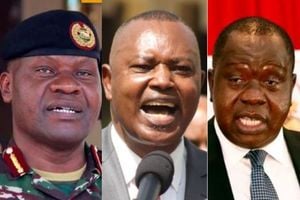
Acting Police Inspector-General Gilbert Masengeli.
The High Court has just sentenced Acting Inspector General Gilbert Masengeli to six months in prison after being found guilty of contempt of court.
Justice Lawrence Mugambi – feeling helpless from watching Mr Masengeli stretch his luck beyond the confines of the powers of mercy – was left with no other choice but to ask the prison tailor to jumpstart his sewing machine, as the Commissioner General of Prisons sends a team to locate a slightly used bar soap and faded towel for their newest high profile guest.
It should never have been this way. Growing up, the Kenya Police was famed for their enduring legacy of – among a raft of roles and responsibilities – maintaining law and order.
In the immediate community, whenever a member became fearful of their safety and security, it is to their nearest police station they ran to first for protection of their fundamental rights and basic freedoms.
Almost all the time, it felt safe being under the canopy of the men and women in uniform as their word was reassuring as it was fulfilling.
Almost all the time, this feeling was replicated among the general public across the length and breadth of the country.
However, this sense of police protection was not in lack of bad apples who systematically poisoned the public trust in the police service aided by a waterlogged judiciary struggling with the elimination of red tape in the discharge of justice regardless of class, rank or file.
A compromised police service and a struggling judiciary is a dangerous mix for a toddling country bedeviled by weak institutional frameworks and waning political goodwill.
For a country that views public policy from the lenses of historical inter-ethnic rivalries, there is always the desperate need for a uniformed service with a national outlook that defers only to the constitution regardless of whose presidential standard is on top of the tree at State House, Nairobi.
Without that public support that emanates from having the people on your side, the national police service risks being viewed from the prism of the president’s militia who only does what makes State House happy .
The bulk of Kenyans who don’t trust the police and cannot afford a lawyer have been left with no other choice but to seek private means of implementing the law.
Depending on the depth of your pockets, this private protection ranges from tucking a rusty blade under your withering waist, to living in a state-of-the-art security bubble that includes exercising your private right to walk with a platoon of private close protection security, driving around in military-grade armoured cars sometimes with a mobile armoury, and dredging mysterious bunkers in your home to dive into whenever the government decides to point their intimidating arsenal at your temple.
It is exactly two years since President William Ruto lifted the Bible at a roaring Kasarani Stadium and promised God and his country, that he will break free from the sins of his predecessors who treated the constitution like a piece of paper to warm themselves whenever their homes were experiencing wintry conditions. It sounds like poetry that on the day the regime was commemorating this annual milestone, the Acting Inspector General of Police was being sent to prison for contempt of court.
The people that matter at State House may look at these occurrences and laugh at the court for wasting their time jailing those who are considered untouchable.
The Acting IG may also brush this latest setback knowing he’s got political protection.
However, to the general public, these things government officers do making a mockery of our institutions of democracy emboldens the ordinary Kenyan to wake up each morning and defend these institutions from systematic collapse.
It’s almost certain that the Interior Cabinet Secretary – who has been ordered to effect the arrest – will feign ignorance about the instruction and kick the can down the road. It won’t be the first time an arrest warrant has been slapped on a public officer and the police froze their eyes from the direction of the culprit.
One day, Kenya will get a listening, caring, government that preaches water and drinks water – an empathetic, pro-people, regime that puts public interest before their friends in high places.
There is no use for the President to supervise the swearing-in of judicial officers when he cannot supervise the implementation of court orders among members of his executive branch, who directly answer to him.
Indeed, you cannot give judges the power to read and write judgements on one hand and take away that power with your other hand by watching your officers frustrate the court.
Granted, the judiciary may not be a darling of Kenyans, but it’s all we got right now.
In a country where Kenyans are abducted from the streets and caused to disappear without a trace, the only house we can run to for safety is the house of laws, after being abandoned by those who promised us heaven on earth.
When you visit the online portal of the National Police Service, there’s a page in there that lays out the objects and functions of their officers pursuant to Article 244 of the Constitution. In it, they undertake to train their staff to the highest possible standards of competence and integrity, and to respect human rights and fundamental freedoms and dignity. You need to read it to believe it.
Disobeying court orders and making a mockery of the court process is nowhere near the lowest possible standards of competence and integrity let alone respecting human rights and fundamental freedoms and dignity. Moreover, it neither fosters nor does it promote relationships between the police and the broader society – another of their mission objectives.
Kenyans have ears and they can see these things. Whenever a government officer disobeys court orders and walks around town like he owns the world, the pockets of public trust in the government takes another massive dent – before long, there will be nothing left to hang on to and it shall be free for all.
Two years is enough time for the president to sit upright and get down to work. In six months’ time, which will be historic, he will have hit his half-term mark, and might never win back the hearts of his voters who believed he was chosen by God, and those who have been giving him the benefit of doubt.










